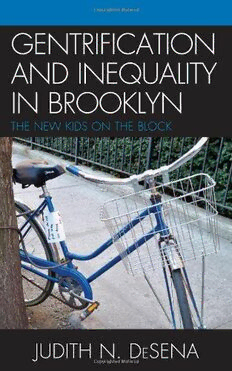
The Gentrification and Inequality in Brooklyn: New Kids on the Block PDF
117 Pages·2009·1.171 MB·English
Most books are stored in the elastic cloud where traffic is expensive. For this reason, we have a limit on daily download.
Preview The Gentrification and Inequality in Brooklyn: New Kids on the Block
Description:
While most studies on gentrification focus almost exclusively on its causes and consequences through an examination of housing, class conflict, and the displacement of residents, this book analyzes the process of gentrification. Gentrification and Inequality in Brooklyn examines the ways in which the established working-class and lower-income residents of Greenpoint, Brooklyn remain socially segregated from the incoming gentrifiers, with both groups forming parallel cultures within the shared physical spaces of the community. Desena broadens the typical analyses of gentrification to include the grass roots dynamics which create social class relations that lead to residential segregation created by social class relations. Drawing upon areas traditionally under represented in urban sociology, including families, women, children, and local institutions other than housing, this study explores the ways in which working-class residents, in the course of their everyday lives, negotiate change in their neighborhood and dissimilarity with their new (gentry) neighbors. Gentrification and Inequality in Brooklyn touches on issues familiar to anyone who has lived in a multi-class or multi-ethnic community, while offering new perspectives on the ways that such communities develop and maintain the boundaries of social segregation.
See more
The list of books you might like
Most books are stored in the elastic cloud where traffic is expensive. For this reason, we have a limit on daily download.
